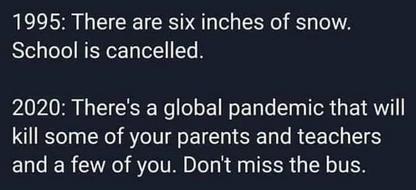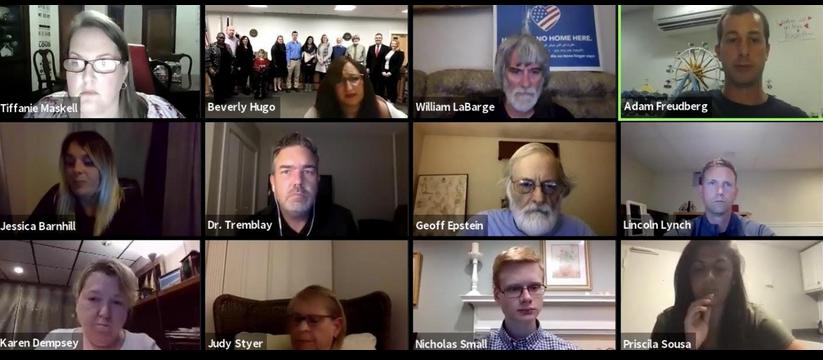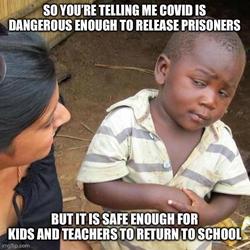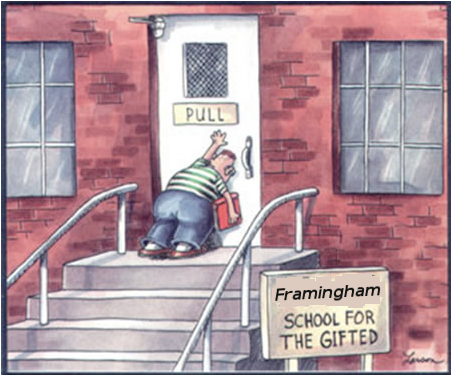

|
In the Covid-19 environment, it is well known that school children
are the largest asymptomatic incubators of Covid-19.
Stealth in the form of asymptomatic transmission is this
adversary's secret power.
These enjoyable children have zero symptoms (or sniffles) but are carriers and transmitters and they will be delighted to share their virus with mommy and daddy and grandma and grandpa (if they still have either or both) with loving hugs and kisses. So opening schools will merely hasten to eliminate lots of grandmas and grandpas (and blacks and fat diabetics). I do not see a vaccine available mid-2021 if one can be made. Forget this Warp Speed crap. Testing it and mass manufacturing it will be well into next year. I, Harold J. Wolfe, at age 70, will be actively taking notes on who votes to open schools and placing me at risk because I have plenty of home contact with a sixth grader and a high school senior.

Apparently, Covid-19 is so deadly that we have to release prisoners, but it's also so benign that we can reopen schools, after we closed them all on just one infection back in mid March. What happens with another infection, or better yet, a death? Every safety plan I've seen that would allow schools to reopen requires that kids behave in ways that no child has ever behaved in the history of children. I see that the Framingham school committee, superintendent, and Board of Health will have a virtual meeting because it's not safe to meet in person to discuss sending kids safely back to school. I'm confused. Is this stupidity or is this hypocrisy? When a new family that got off the boat, plane, train or crossed the river and requires a translator, moves into Framingham and registers for school, the registration office could be the very first healthcheck for any health issue like Covid-19. Do you test just the student or the entire family? Do you have enough PPE for the teachers and poverty stricken non-english speaking students? If health care workers are in short supply, I wonder how teachers can be supplied. Will the PPE be re-used day to day?

I recently read an article claiming that children are more likely to get infected by adults and not from their peers in schools. This is obvious, since schools are closed and the children are all isolated at home. Who else is going to infect them? This is one of those doublespeak items generated by teachers unions. I am sure the FTA is in overdrive pushing very hard to reopen schools so they don't suffer layoffs like they should. The FTA is the largest voting block in Framingham and rakes in one million a year to spend on the councillor and school committee members. Councillors and school committee members can almost feel their hot breath. BTW, I had read somewhere that the new Fuller school was designed in a more open environment that facilitates the transmission of any airborne disease. Lot of open spaces. Covid-19 thanks you. Covid-19 lives matter. Keep the virus alive. Yup! We are still trapped in the Twilight Zone until (and if) a Covid-19 vaccine comes! I triple dog dare Dr. Robert Tremblay to sit in a class of ten fifth graders at Woodrow Wilson school and do deep breathing exercises. Better yet, a class of black students, since it is well documented in Covid-19 logs that Black Lives Don't Matter. That difference may be blamed on racial inequities in our medical care, but it is more likely a real evolutionary racial inequity in our immune system. Just like the evolutionary racial inequities in SAT scores for as long as the SAT has been offered. The NEA has said any return to in-person classes must be accompanied by districts receiving personal protective equipment, deep-cleaning procedures that meet Centers for Disease Control and Prevention standards, classroom layouts that accommodate six feet of distancing and hand-washing and sanitizing stations installed. I'm a tad cynical about deep cleaning procedures on the basis that viruses cannot be seen without electron microscopy and you cannot hear them scream if they die. You might kill 99% of them, but the remaining one percent will be very, very angry. Given the 2019 Annual Report, I do not see any monies spent for such a microscope by the gifted students. According to Tremblay, students identified as high needs will receive priority placement for full in-person learning for delivery of services and supports. Interventions will also be provided through direct support to students and software. Given SAT scores, this will most likely discriminate against white and asian people. Tremblay doesn't consider that the most intelligent also have high needs. Buy the smart ones an inexpensive electron microscope ($60K). I know, its four times the amount he spent on gifted students in the 2019 Annual Report ($16,000). But it's OK to spend over $20 million on SPED students. |

| Here's why 100% in-person school is unlikely in Framingham during the 2020-21 school year. | July 16, 2020 |
|---|---|
| Zane Razzaq 508-626-3919 | Metrowest Daily News |
|
Once students are at school, the costs continue to pile up: just 12 weeks worth of personal protective gear for full in-person school would cost at least another $2 million.
FRAMINGHAM - Transportation represents the biggest obstacle to the return of 100% in-person learning, a top school official said Wednesday. Buses would need to carry one-third of their typical capacity to allow for physical distancing. That means 154 additional buses, costing $12.3 million just to get students to buildings. Those extra buses, combined with parents dropping kids off, would clog city streets with unsustainable traffic. Plus, some districts are considering hiring monitors - at $27,000 each - to ensure students wear masks and keep a distance. "And really, there's no chance you'd get 154 buses. And even if you did, I don't think we'd get 154 drivers ... a full, five-day in-person situation I don't think financially would be feasible," said Lincoln Lynch IV, executive director of finance and operations for the district. Once students are at school, the costs continue to pile up: just 12 weeks worth of personal protective gear for full in-person school would cost at least another $2 million. Because of these challenges, district officials have prioritized a hybrid approach as they careen toward reopening schools for the 2020-21 academic year. Back-to-school planning dominated a Wednesday virtual meeting that included both School Committee and Board of Health members. Under the evolving plan, students would spend one week in school, followed by a week of learning at home. Children classified as high needs would be prioritized for full in-person learning to get needed services and supports. All students and staff will wear face coverings, and maintain at least 6 feet of distance whenever possible. Some areas - such as extracurricular activities and visitor procedures - continue to be fleshed out, with more state directives expected. Families also reserve the right to have their child continue with 100% remote learning. Do you want your coronavirus news in one place? The Daily News is curating a Coronavirus newsletter with the latest local news on the coronavirus outbreak. Our goal is to inform, but not overwhelm. Head over to MetroWestDailyNews.com to sign up for the Coronavirus newsletter and make sure you never miss a thing. You pick the news you want, we deliver. To make busing work, Framingham is considering transporting only kindergartners to sixth-graders that live more than 2 miles from their assigned schools. Those who live less than 2 miles away, and all students in grades 7-12 will be offered transportation if there are open seats after eligible students have a seat. Framingham Public Health Director Sam Wong suggested schools begin with a month of remote learning, before shifting to the hybrid model. That would give officials more time to prepare, he said. "The timing for the school to have to do a lot of retrofit to a lot of its physical structure is very, very limited ... that would give us a lot of time to make sure the school facility, the physical plan, is fully equipped and modified," said Wong. A phased-in start would also allow school to begin after most of the Eastern equine encephalitis season, limiting the risk of exposure and need to cancel recess. "I'll take the controversy of outdoor recess any time over the pandemic," said Wong. Superintendent of Schools Robert Tremblay called trying to untangle the problems that will arise during an in-person school day - student trauma, regression, conflicting opinions on face coverings - a "daily conversation that seems to have no end." "With every single thing we talk about, it has tentacles that go out in 100 different directions," he said. Tremblay said the district also plans to develop a more robust remote learning program, including the possibility of live-streaming lessons. The "crisis learning" that schools scrambled to put together during COVID-19 closures left many students behind, he said. "We did not do enough to push the content forward," said Tremblay. "We can't afford to do that any longer. The idea of providing resources and having parents be the primary educators - frankly, that ship has sailed."
Some School Committee members said teachers should be afforded the choice of not returning to in-person instruction. "Asking them to come back is almost asking them to choose to be sick, because we know that's how it's going to be," said Vice Chairwoman Tiffanie Maskell, of District 7. The Massachusetts Teachers Association, which represents Framingham's teachers union along with about 400 other associations, has put forth a phased reopening plan that mirrors the state's gradual reopening of businesses.
Tremblay plans to provide weekly live updates on the matter at 10:30 a.m. and 4 p.m. on Wednesdays. Updates will begin July 22, with sessions recorded and questions sent via email will be answered for those who are unable to participate live. Draft plans are due to the state Department of Elementary and Secondary Education on July 31. The district will also submit plans for in-person learning and 100% remote learning, as required. The state had asked school districts to prioritize a 100% in-person model in their planning. |
|
| Framingham schools to discuss reopening at Wednesday meeting | July 12, 2020 |
|---|---|
| Zane Razzaq 508-626-3919 | Metrowest Daily News |
|
Framingham school and health officials will hold a joint meeting to review state guidance on school reopening and discuss what it means for the city before a plan is due to the state on July 31.
FRAMINGHAM - School and health officials will hold a joint meeting to review state guidance on school reopening and discuss what it means for the city before a plan is due to the state on July 31. The meeting will be held at 7 p.m. on Wednesday. It can be viewed live on the Government Channel: Comcast 99, RCN 13/HD613, Verizon/Fios 42, and on the district's Facebook page. It will also be on Zoom at the following link or phone number: https://us02web.zoom.us/webinar/register/WN_N0MoiuvGTNiIBOn2zWN4Zg 1-646-876-9923 Webinar ID: 812 1605 5414 Topics will include: COVID-19 Report and FPS & Department of Public Health Collaborations Continued Discussions on DESE Guidance for School Reopening Flu vaccinations and COVID-19 testing Eastern equine encephalitis (EEE), mosquito control and outdoor classrooms The state Department of Elementary and Secondary Education is requiring all districts to submit three different school reopening plans by the end of the month: in-person learning with new safety requirements; a hybrid of in-person and remote learning; and remote learning. Want news like this sent straight to your inbox? Head over to MetroWestDailyNews.com to sign up for News Headlines and make sure you never miss a thing. You pick the news you want, we deliver. School officials will spend July developing the plans, while also awaiting more state guidance. It will be presented during a July 29 School Committee meeting. Students, staff, and families can help with the planning process by filling out surveys the district has distributed. Anyone with ideas or questions can email Superintendent Robert Tremblay at rtremblay@framingham.k12.ma.us. "Nothing would make me happier than to provide a complete, detailed, and final FPS reopening plan so that families and staff can prepare for the start of a new school year," said Tremblay. "The reality is that such a plan is not possible at this time with the ever-changing science that surrounds COVID-19 and with constantly shifting guidance from the DESE. Everyone is working hard to come up with answers, provide direction, and ensure safety above all, but we all just need to be patient as our plans necessarily evolve with each phase of the pandemic. We will continue to do our best to provide information as it becomes available and to engage our community in the planning through surveys and webinars. We only ask for your patience, understanding, and flexibility in return." Gillian Carcia, chair of the Board of Health, called the district a "important partner in addressing the many public health issues we face in our city." School Committee Chairman Adam Freudberg said that "together we can best attempt to get through the uncertainty and stress reopening school creates by working through each issue in collaboration with local public health experts." Meanwhile, state Education Commissioner Jeff Riley asked school leaders to hold off on publicly announcing plans until early August. "While preparations for the fall must move forward, we are still waiting for key information that will directly impact the best fit reopening model for each community," said Riley in a letter. |
|
| UV lights, thermal cameras: For some, school reopening is big money | July 11, 2020 |
|---|---|
| Zane Razzaq 508-626-3919 | Metrowest Daily News |
|
Districts are responsible for securing their personal protective gear and other COVID-19 supplies, and are expected to shoulder the costs. In Framingham, it will take an estimated $2 million, according to Superintendent Robert Tremblay.
Clean Harbors Environmental Services workers visited Potter Road Elementary School in Framingham in March to "deep clean" the school in light of the coronavirus. [Daily News and Wicked Local File Photo]
FRAMINGHAM - Throughout the week, Superintendent Robert Tremblay's inbox flooded with marketers hawking everything from foot-activated hand sanitizer stands to electrostatic disinfectant cleanings to air purifiers. The fall return of in-person school has unleashed a tsunami of marketing on cash-strapped districts. Since the COVID-19 pandemic hit in mid-March, Tremblay said unsolicited pitches have come "fast and furious." And if it's not equipment meant to protect against the coronavirus, it's remote learning software. "Everyone wants to sell you a thermometer, gloves, hand sanitizer," Tremblay said. "They're in the business, I get it. I'll let you know if I need you." Vendors have seized the opportunity. In normal times, Chicago-based Upstaging Inc. produces lighting at shows for acts such as Beyonce, Miley Cyrus and Taylor Swift. But when concerts came to a screeching halt in March, the company pivoted to fog-free face shields, among other devices. They can be branded with a custom decal for added school spirit, a marketing email notes. There's also the $2,795 QuickTemp, an infrared temperature kiosk that takes and records the temperature of everyone entering a building. It's available on a shorter stand to accommodate children's height. And for just $79.99, teachers can don the ShieldPod: a wearable tent, kept in place with shoulder straps and a belt. An advertisement shows a teacher peering from behind one of the three clear panels, leaning over a student's desk. Most of the products - or "solutions" - have not been deemed essential by state or federal guidelines. Massachusetts health officials even decided that temperature checks would not be conducted at schools due to the potential for false readings. Natick Superintendent Anna Nolin has also been beleaguered by marketers, as the town grapples with a possible $8 million shortfall. One sales person called her office repeatedly, before realizing school administrators are working remotely. "It's almost like these vendors don't know what's going on. They're not understanding the landscape, what schools can spend and can't spend on and (they're) just trying to spin their products," said Nolin. Districts are responsible for securing their personal protective gear and other COVID-19 supplies, and are expected to shoulder the costs. In Framingham, it will take an estimated $2 million, according to Tremblay. These extra unplanned costs come as districts cope with budget cuts and with state aid remaining unclear. Framingham, Natick and more than 100 other school committees passed resolutions calling on the state to cover all costs that districts will face to protect students, staff and others. Framingham's school finance chief, Lincoln Lynch IV, said the district will buy necessary supplies mostly from state-approved vendors. In the deluge of outreach, he's heard from companies that do not specialize in personal protective equipment, such as a packaging company that now sells face masks. "It comes down to a trust factor," said Lynch. "You just started into this business a couple of months ago. How would I know the product would keep the students and staff safe?" SARIN Energy Solutions is among the companies that have pitched Tremblay. The Kansas company makes shortwave ultraviolet lights that can kill airborne germs and viruses. It's not meant to replace manual cleanings or social distancing, and would be used in between classes or at the end of the day, said marketing director Robert Gonzalez. President Inayat Noormohmad said SARIN has seen demand from offices, nursing homes and nursery schools. Some people even want it in their own homes. Several schools in Kansas showed interest, and the company then began promoting to districts around the country. Outreach to superintendents and other leaders is meant to be educational, said Noormohmad. "We understand that they are probably slammed, but knowledge is important to decision-making," he said. "We want to be the first to educate our customers about what this is and how it works. What could be more dangerous than COVID is the false hope created through products that don't work." Noormohmad said the company's "bread and butter" is normally LED lights. Demand slowed down during COVID-19 shutdowns, though it's picked up since. Local school officials are not alone in their frustration. A May survey by the National Superintendents Roundtable titled "Just Stop It!" revealed deep irritation with marketing campaigns targeting schools during the COVID-19 pandemic. Sixty-seven of the roundtable's 97 members participated. Nearly half of the surveyed superintendents said they'd prefer "to be left alone" from educational technology firms currently. Just 20% described their recent experiences with vendors as positive. Nancy Rappaport, a part-time associate psychiatry professor at Harvard Medical School, advised school leaders to be careful when considering some services. She's worried students who are desperate to connect with role models after COVID-19 closures will return to a now-unwelcoming school environment. "If it becomes a militant process to catch students who have a fever, where you discover a student has an elevated temperature and there's a public shaming and ostracizing, that is something counterproductive to students and staff," said Rappaport, speaking about products like infrared no-contact thermometers or thermal cameras. "If we build a fortress for kids to learn, that's going to be a barrier." The trend is similar to the $3 billion "school hardening" industry that rushes to sell metal-detectors, barricades and bullet-resistant backpacks after school shootings, said Rappaport. "We have a history of companies capitalizing on educator fears," said Rappaport. Plans to reopen schools are due to the state on July 31, and schools chiefs are trying to untangle a web of issues before then. Districts may have to expand their bus fleets to allow for social distancing or staggered scheduling. They're also bracing to welcome back students reeling from trauma and the loss of routine. "Quite honestly, the things we need are so big that no vendor will have them," said Nolin. Tremblay said the pitches inject distraction, saying it feels as if companies are "capitalizing off our misery." "If we need resources, we'll go find them. But the flooding of inboxes with unsolicited sales tactics - I'm not loving it," he said. |
|
| Framingham Teachers Association Opposes Returning To Any In-Person Learning For Fall 2020 Without Safety Assurances | July 27, 2020 |
|---|---|
| FTA president Christine Mulroney | Framingham Source |
|
FRAMINGHAM - The members of the Framingham Teachers Association care deeply about the safety and well-being of our students, as well as the quality of the education we provide. The best interests of our students and overall success of this school system are our top priorities. We have demonstrated our willingness to go above and beyond to ensure that our students have every opportunity to be successful. We want nothing more than to be back in the classrooms with our students.
However, it is simply not yet safe for a physical return to schools, as that will place students, educators, staff and families at risk. Health officials have not fully reassured the public of the utmost safety to return to school buildings while COVID-19 persists. In all teaching and learning environments, 6 feet of social distancing must be the minimum standard. Face coverings must be worn by ALL students, staff & visitors with the exception of documented medical conditions, where face coverings are contraindicated. The Framingham Teachers Association opposes returning to any in-person learning in the Fall of 2020 until the community and staff are assured it is safe to do so. This is a difficult decision for everyone. But it is the best way to ensure everyone's health and safety and allow for all of us to begin planning now for a remote learning environment. We call on the District to work together with us, without further delay, on improving, refining, and setting standards for remote learning. We request that the School Committee and Superintendent make public the inspections and evaluations of the HVAC systems and windows of each building, including upgrades and repairs to HVAC systems and windows in order for them to open and have screens to provide proper air exchange, filtration and climate control to ensure the safety of students, educators and staff. This information must be communicated in multiple languages and terms that the general public can understand. We also call for the district to commit to all necessary updates to windows, HVAC systems, air quality and air exchange with outside air before any staff member or student is required to report to any building. Environmental concerns looming large include but are not limited to:
The FTA embraces a plan by the Massachusetts Teachers Association, American Federation of Teachers-Massachusetts and The Boston Teachers Union to have a phased-in return to schools which begins with remote learning and allows for proper health and safety measures to be brought into place and properly monitored. To that end, the FTA supports a remote model to start the 2020-2021 school year. A remote start, which includes a later start date for students, will allow time for educators and staff to participate in necessary professional development, collaborate with peers and prepare for an improved distance learning environment, to connect with families either virtually or safely in person to make sure they have the tools they need and are prepared for distance learning. It also provides time to build initial relationships with students through virtual platforms without wearing a mask. While we understand the district is required by DESE to submit a plan and the need for our families to be informed, we are saddened and disappointed that this detailed document was only shared with the association on July 24 for the first time, without our input, despite requests to bargain in advance of the document being sent to school committee for approval on Wednesday, July 29. Any focus on getting our students into school buildings before conditions are safe is distracting from the most important conversations; ensuring that our instructional strategies meet the needs of all students, especially in light of the academic loss last spring. Our hope is that by focusing on remote learning, we can put all of our energies towards meeting the academic and social/emotional needs of our students while they remain at home learners. To reopen buildings too soon, with the likelihood of closing again due to a potential surge in infection rates, ignores the reality that, without testing, contact tracing, and proven anti-body therapies, the risk level for the entire community is too large. Respectfully submitted, Christine Mulroney, President Framingham Teachers Association On behalf of the FTA Executive Committee and FTA Representative Council |
|
Send comments to:
 hjw2001@gmail.com
hjw2001@gmail.com
|

|












